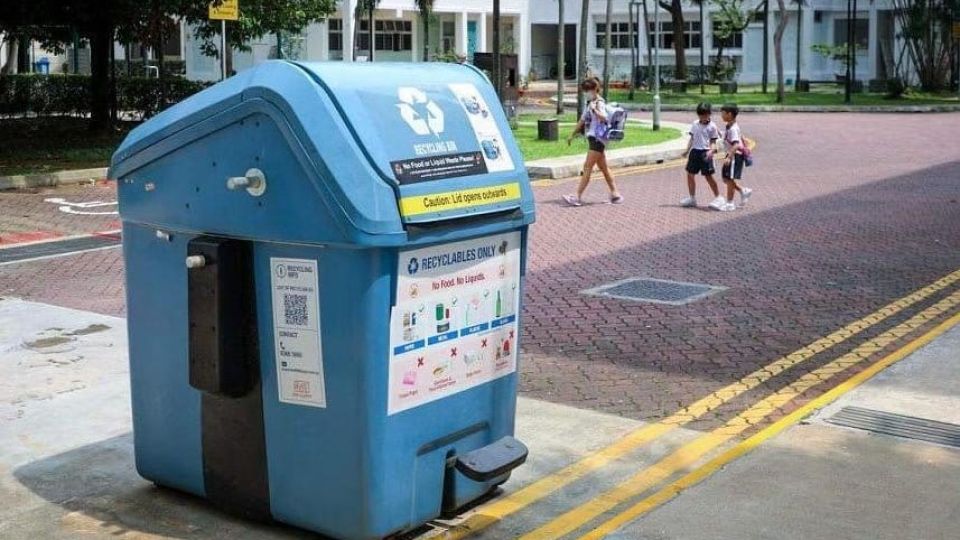May 4, 2023
SINGAPORE – The domestic recycling rate in 2022 fell to 12 per cent – the lowest in more than a decade – because less paper, cardboard, textile and leather were exported for recycling, the National Environment Agency (NEA) said on Wednesday.
Between 2012 and 2018, Singapore’s domestic recycling rate stood at between 19 per cent and 22 per cent. The rate declined from 2018 as China banned the import of 24 recyclables, including paper and plastics.
The domestic recycling rate is the percentage of waste recycled from households, shophouses, education institutions, petrol stations, hawker centres and places of worship.
Adding to the lower rate is the 1.86 million tonnes of domestic waste collected in 2022, up from 1.82 million tonnes the year before.
The NEA, which released its annual waste and recycling statistics for 2022 on Wednesday, said high freight cost for transporting the recyclables overseas for processing, especially paper and textiles with lower market value, was the main reason for the domestic recycling rate falling to 12 per cent from 13 per cent in 2021.
Zero Waste SG executive director Tan Huileng said: “It will be helpful to help residents understand what happens after their commingled recyclable waste is deposited into the blue bins, to build confidence in our segregation and recycling infrastructure.
“From the consumers’ end, encouraging them to intentionally buy products made of recycled material, when there is a need for said product, will also boost the demand for recycling.”
Dr Seeram Ramakrishna, a board member of the Plastic Recycling Association Singapore, said: “The continued low domestic recycling rate is a bit disappointing, given the range of recent measures like the Recycle Right campaign.
“But these outcomes are not surprising as economic and social activities accelerated post-Covid-19. It also means that we need to accelerate our waste-management measures and plans, and speedily embrace solutions and innovations unique to the Singapore context.”
Plastic recycling firm Lian Gim, which collects plastic waste from non-domestic sources in Singapore, exports two to three 40-foot containers of waste every week to its plant in Vietnam for processing because of local constraints such as high operational costs, manpower shortage and space.
Its managing director, Mr Joe Tan, said: “There is a lot of plastic waste to be collected in Singapore. However, it has been difficult to keep up with the costs, particularly having suitable space to store the plastic waste as well as the equipment to haul, compress and bale them before sending to Vietnam.”
NEA’s blue recycling bins, typically located near HDB blocks, collect household recyclables. But about 40 per cent of these cannot be recycled due to contamination from food and liquid waste, tissue paper and other items.
In 2021 and 2022, the overall recycling rate for food waste and plastics – which are among the priority waste streams for Singapore – remained relatively unchanged.
In both years, only 6 per cent of plastic was recycled, while 18 per cent of food waste was treated in 2022, down from 19 per cent in 2021.
The overall recycling rate in 2022 reached 57 per cent, up from 55 per cent in 2021, with more demolition and ferrous metals recycled, owing to more construction and demolition activities following the easing of Covid-19 restrictions.
It was, however, lower than the 59 per cent recorded before the Covid-19 outbreak in 2019.
About 7.39 million tonnes of waste were generated in 2022 – 6 per cent higher than in 2021 and slightly surpassing the more than 7.2 million tonnes of waste produced before the pandemic in 2019.
Efforts are under way to encourage residents to recycle more and reduce their use of disposables. From July 3, most supermarkets will start charging at least five cents for a plastic bag.
From 2025, bottled and canned drinks will cost 10 cents more, but shoppers will get the deposit back once they return the empty plastic bottles and cans for recycling.
The recycling rate for glass inched up from 13 per cent in 2021 to 14 per cent in 2022 after the country’s first glass-recycling company was set up here.
Singapore aims to raise its domestic recycling rate to 30 per cent and its overall recycling rate to 70 per cent by 2030.

